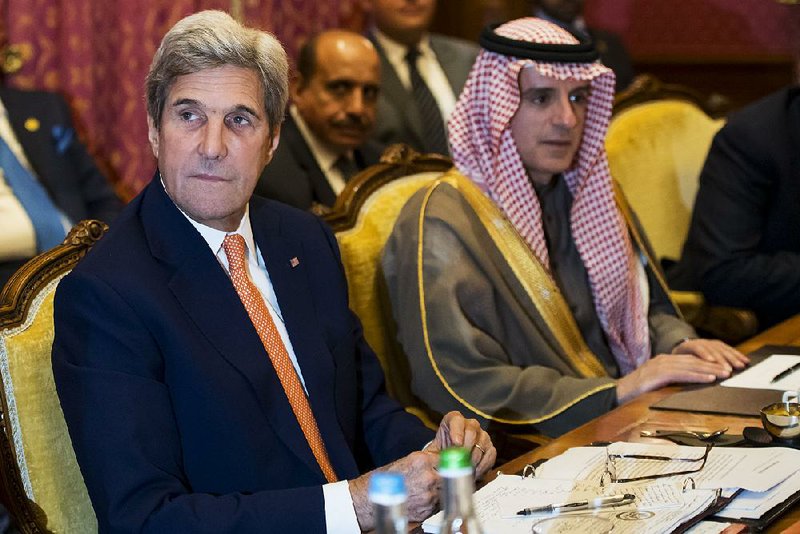LAUSANNE, Switzerland -- U.S. Secretary of State John Kerry said Yemen's Houthi rebels released two U.S. citizens on Saturday.
Kerry said the Americans, whom he did not identify, were freed as part of complicated diplomatic arrangement that included airlifts for Yemenis wounded by an airstrike last weekend carried out by a Saudi-led coalition. Those individuals were taken to Oman for treatment.
Kerry said the U.S. has been working on such efforts for the past few days, alongside a push for a cease-fire in Yemen that would allow the country's internationally recognized government and the Iran-backed Houthis to return to negotiations.
The state-run Oman News Agency said two Americans held in Yemen were released and flown to the sultanate after negotiations between Omani officials and Yemeni authorities in the capital, Sanaa, which is controlled by the Houthis and their allies. It also did not identify the Americans.
Yemen's war pits the government against the Shiite Houthi rebels and allied army units loyal to a former president. A Saudi-led coalition has been intervening on the side of the government since March 2015.
After peace talks broke down two months ago, the Saudi-led and U.S.-backed coalition stepped up airstrikes and forced the closure of Sanaa's international airport. Negotiators representing the Houthis and their allies ended up stranded in Oman, but were allowed to return to Yemen under the latest deal.
The bombing of the packed funeral hall last weekend, which killed 140 people and wounded 600, appears to have galvanized diplomatic efforts. An internal probe by the coalition said Saturday that the strike was carried out based on "wrong information" and had not been approved by the coalition's top command.
The coalition's Joint Incidents Assessment Team said a party affiliated to Yemen's General Chief of Staff headquarters had provided intelligence that the hall in Sanaa was filled with leaders of the rebels.
The unidentified party insisted the site was "a legitimate military target," the English-language statement said. The Air Operation Center in Yemen then directed a "close air support mission" to target the site without approval from the coalition's command.
The investigators called on the coalition to immediately review the rules of engagement and recommended that compensation be offered to the victims' families.
"[The team] has found that because of non-compliance with Coalition rules of engagement and procedures, and the issuing of incorrect information, a Coalition aircraft wrongly targeted the location, resulting in civilian deaths and injuries," it said.
The coalition, which had initially denied any responsibility, said it accepts the results of the investigation and has started to implement the recommended changes.
More than 100 people who were wounded in the funeral hall bombing have been allowed medical evacuation to seek treatment outside of Yemen, a Yemeni government official said on condition of anonymity because he was not authorized to speak to the press.
Speaking to reporters in Switzerland, where he was attending talks on Syria, Kerry said a plane flew the Houthi delegation to Yemen from the Omani capital, Muscat, and returned with people wounded in the funeral hall strike.
"This is something we've been working on for the last days," he said.
He said the effort "also secured the release of two American citizens from the Houthis. Their names are not being released."
Kerry said the U.S. was "very pleased" with their release and was working to resolve other hostage situations in Yemen and elsewhere.
Kerry said he had spoken with the U.N. envoy to Yemen as well as with the Saudis, and that he was "continuing to work very hard to get a framework in Yemen that creates a dynamic that allows to get back to the table."
"It remains a top priority for us to try to end the violence and get to the table as soon as possible," Kerry said.
State Department spokesman Mark Toner later issued a statement saying the U.S. was "deeply grateful" to Oman's Sultan Qaboos bin Said for his assistance in securing the release of the Americans.
"We recognize the humanitarian gesture by the Houthis in releasing these U.S. citizens. We call for the immediate and unconditional release of any other U.S. citizens who may still be held," it said.
Oman, a U.S. ally which maintains warm relations with nearby Iran, has served as a mediator for past prisoner releases and other diplomatic initiatives.
Earlier this month, Oman was credited with helping secure the release of a French-Tunisian woman working for the Red Cross who had been kidnapped by armed men in Yemen and held for nearly a year.
Information for this article was contributed by Maggie Michael, Ahmed Al-Haj and Joseph Krauss of The Associated Press.
A Section on 10/16/2016
